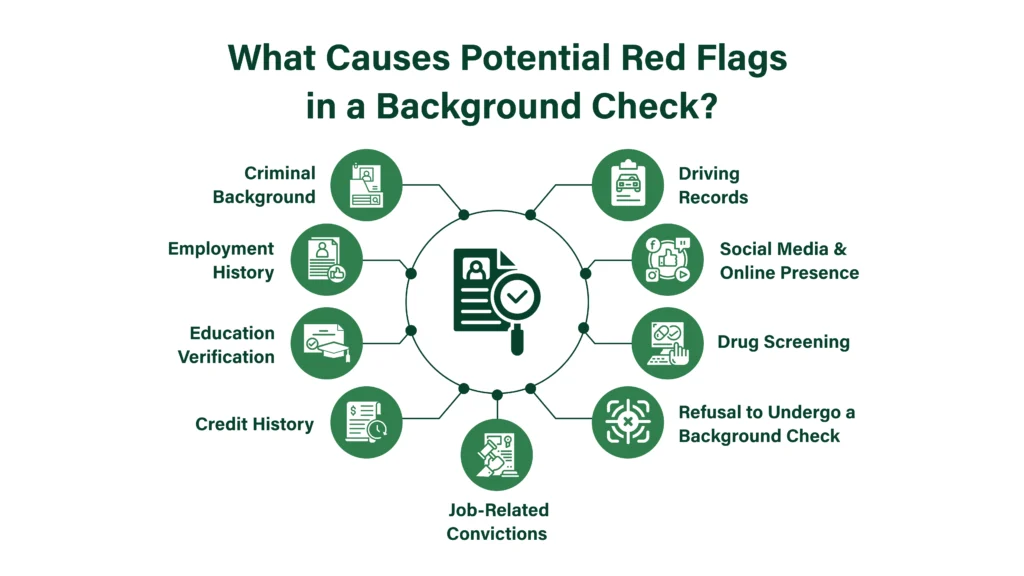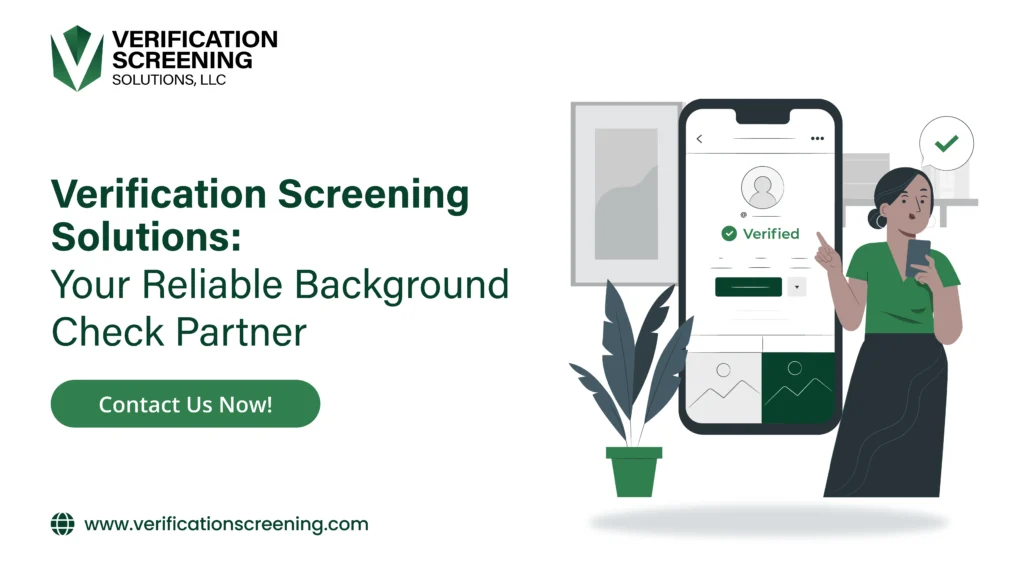For employers, business owners, and recruiters, these checks are not just a formality—they are vital in ensuring that potential hires meet the role’s requirements and align with the organization’s values. Whether hiring for an entry-level or senior leadership role, a comprehensive background check is critical in selecting the right candidate.
But what shows up in a background check? What information is revealed, and how can you identify potential red flags?
In this blog, we’ll explore everything you need about background checks and how they can help you make informed hiring decisions.
Background Check: An Overview
Background checks can cover a wide range of information depending on the job, industry, and employer’s needs. Here’s a breakdown of what typically appears:
What Causes Potential Red Flags in a Background Check?

While background checks provide valuable information, it’s important to understand how to interpret the findings. Not every piece of information is a dealbreaker. Some findings might raise red flags– potential concerns warranting further investment. In the following, we’ve listed out those potential red flags:
1. Criminal Background
Let’s briefly take a look at what criminal records are inclusive of:
- Felonies: Serious crimes like assault, theft, or fraud can be major red flags, especially for jobs in security, finance, or roles requiring trust.
- Misdemeanors: While generally less severe than felonies, misdemeanors like minor theft or disorderly conduct can still cause concern, depending on the position.
- Arrests: Some background checks may reveal arrests without convictions, though not all employers consider this a disqualifying factor.
2. Employment History
Employment history verification is a critical component of a comprehensive background check.
Employers meticulously review a candidate’s work experience, confirming details like:
- Previous employers
- Job titles
- Dates of employment
Moreover, any inconsistencies, such as unexplained gaps in employment or discrepancies between the resume and verified information, can raise red flags. Employers value reliability and stability in their workforce, so frequent job changes or inflated roles may also warrant further scrutiny.
Additionally, employers often contact professional references to gain valuable insights into a candidate’s past performance and work relationships. Negative feedback from these references can significantly impact a candidate’s chances of securing the position.
3. Education Verification
Background checks verify educational qualifications, such as degrees, diplomas, and certifications. Employers confirm that applicants attended the institutions listed and received the credentials claimed. A falsified degree or inflated academic achievements are significant red flags, particularly for roles requiring specialized skills or licenses.
4. Credit History
For finance roles or those involving positions of trust, a credit check may be part of the background screening process. Credit checks can reveal issues like:
- Bankruptcies
- Accounts in collections
- High levels of debt
These findings suggest financial irresponsibility, which could be a red flag, especially in positions that involve managing money or handling sensitive financial information.
5. Driving Records
Driving records are checked for roles where employees will be operating vehicles, such as delivery drivers or commercial truck operators. Background checks can reveal:
- DUIs (Driving Under the Influence)
- Traffic violations
- Accidents
These can be red flags depending on the severity and frequency of the incidents.
6. Social Media & Online Presence
In recent years, social media screenings have become more common. Employers may look at applicants’ public online activity to gauge their professionalism and character. Red flags in this area can include:
- Inappropriate or offensive posts
- Discriminatory remarks
- Unprofessional behavior
These findings can influence an employer’s decision, especially in roles that require interaction with clients or the public.
7. Drug Screening
Many employers, particularly in safety-sensitive industries like transportation or healthcare, require drug tests as part of the background check process. Employers may have zero-tolerance policies, and failing a drug test can be an immediate disqualifier. Legal considerations, such as laws regarding marijuana use, can affect how employers interpret drug tests.
8. Refusal to Undergo a Background Check
A candidate’s refusal to undergo a background check is a significant red flag. It raises serious questions about their willingness to be transparent and could indicate an attempt to conceal potentially damaging information. This reluctance could stem from various reasons, such as a criminal record, a history of employment issues, or discrepancies in their educational background. Employers should proceed cautiously in such cases, as it may signal a lack of honesty or a desire to hide unfavorable information.
9. Job-Related Convictions
While any criminal conviction may raise concerns, job-relevant convictions require particularly careful consideration. It’s essential for employers to assess the nature and severity of the offense, as well as its relevance to the position’s specific duties. For instance, an assault conviction might be a severe concern for a security guard position but less relevant for a data entry clerk. Employers should also consider the age of the sentence and any evidence of rehabilitation before hiring.
Suppose you, as an employer, are witnessing some red flags in candidates you’re screening for a position at your organization. So, what should your way forward be? Let’s explore all the options.
Addressing Red Flags: A Guide for Employers
When you encounter red flags during a background check, it’s natural to have concerns. However, these issues don’t always disqualify a candidate. With the right approach, you can address red flags effectively, ensuring they make informed hiring decisions. Here’s how:
1. Acknowledge the Issue
If a background check reveals a potential red flag—such as a criminal record, employment gap, or inconsistent credentials—it’s important to address it directly with the candidate. Avoiding or ignoring the issue may lead to greater mistrust later. By bringing up the concern transparently, you foster open communication and can better assess the candidate’s integrity and willingness to be honest.
2. Seek an Explanation
Context is key. Candidates may have legitimate reasons for red flags, such as personal or financial challenges, legal issues, or career transitions. Asking the candidate to explain the circumstances gives everyone a clearer picture. Understanding the reasons behind a red flag, especially if it occurred in the distant past or under unique circumstances, allows for a more balanced evaluation.
3. Evaluate Rehabilitation and Growth
Has the candidate taken steps to address the issue? Whether completing a rehabilitation program, pursuing further education, or earning certifications, these actions can demonstrate a commitment to personal growth. You should assess whether the candidate has learned from past mistakes and shown genuine efforts toward self-improvement.
4. Focus on Strengths and Qualifications
While addressing red flags is important, you should consider the candidate’s strengths, skills, and qualifications. Highlighting a candidate’s relevant experience, expertise, and accomplishments can help shift the focus from past issues to their potential contributions to the organization.
5. Prepare to Discuss Red Flags in Interviews
If a red flag is significant, it may come up during an interview. You and other recruiters in the panel should be prepared to discuss it openly, asking candidates to explain how they have addressed the issue and their steps to move forward. Encouraging accountability while maintaining professionalism can guide the conversation toward a productive outcome.
6. Consider Positive References
Professional references can provide valuable insight into a candidate’s character and work ethic, which can help mitigate concerns raised by a red flag. You should contact previous supervisors or colleagues who can vouch for the candidate’s qualifications, reliability, and integrity.
7. Explore Solutions
In some cases, red flags may directly impact the candidate’s ability to perform certain job duties (e.g., a driving violation for a position requiring a clean driving record). Your board of recruiters can engage with candidates to discuss possible solutions, such as additional training or modifying job responsibilities. Offering opportunities for the candidate to demonstrate responsibility and commitment can help address concerns and find a workable solution.
By proactively and openly addressing red flags, you can ensure they make fair and informed decisions when evaluating potential employees. Moreover, as an employer and decision-maker for an organization, you have the full right to support legal considerations, which we’ll discuss next.
Legal Considerations for Employers
As an employer, while conducting background checks, you must adhere to specific laws and guidelines to ensure a fair and legal process:
1. Compliance with FCRA
The Fair Credit Reporting Act (FCRA) requires employers to obtain consent from candidates before conducting a background check. They must also provide a copy of the report if adverse action (e.g., not hiring the candidate) is taken based on the findings.
2. EEOC Guidelines
The Equal Employment Opportunity Commission (EEOC) provides guidance on using background checks to avoid discriminatory practices. Employers must ensure that they are not disproportionately disqualifying candidates from protected classes based on their background check results.
3. State and Local Laws
Different states and cities may have specific laws regarding background checks. For example, some states have “ban the box” laws prohibiting asking about criminal history on a job application. Employers must be aware of the regulations in their jurisdiction to remain compliant.
Navigating the world of background checks can be complex for job seekers and employers. Transparency and awareness are essential for everyone involved. However, as an organization seeking a streamlined and efficient solution, partnering with Verification Screening Solutions can alleviate the burden and ensure a thorough and compliant background check process.
Verification Screening Solutions: Your Reliable Background Check Partner

At Verification Screening Solutions, we ensure that you make informed, confident hiring decisions across all sectors. Whether you’re in healthcare, finance, IT, the government sector, or any other industry, our comprehensive pre-employment and tenant screening services provide the reliability and peace of mind you need.
With a track record of serving various industries, including senior living facilities, real estate, and the entertainment sector, we’re your trusted partner in ensuring compliance and building trust with every hire.
Here are the services we offer:
- County Level Criminal Search
- Statewide Criminal Search
- Federal Criminal Search
- Multi-State Criminal Search
- Motor Vehicle Report (MVR)
- Sex Offender Search
- Federal Civil Search
- County Level Civil Search
- SSN Trace
- Employment Verification
- Education Verification
- Fingerprinting
Ready to simplify and strengthen your hiring process?
Contact us today and take advantage of our industry-leading verification solutions!
